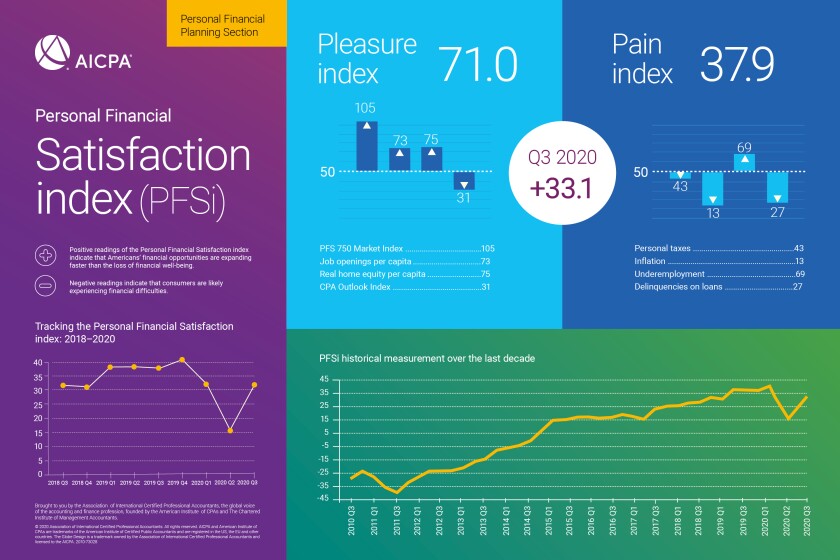Financial satisfaction of people in the U.S. rebounded strongly in the third quarter of the year, according to a new survey by the American Institute of CPAs, reversing the lows in the second quarter in the midst of the recession brought on by the novel coronavirus pandemic.
The AICPA’s Q3 2020 Personal Financial Satisfaction Index measured 33.1, representing a whopping 99 percent (16.5 point) increase from the previous quarter. That’s the biggest quarterly increase in the 27-year history of the PFSi, and a complete turnaround from the second quarter, when the index had its largest ever quarterly drop.
As Vice President, Underwriting Research and Development, Jackie Waas is involved in investigating and developing underwriting innovations, with an emphasis on concept development, research, presenting new ideas, and participating in concept validation activities.
She started her career with RGA in 2018 as Director of Underwriting Services, where she supported direct-to-consumer accelerated offerings, including assisting with the auditing of the e-underwriting program and helping develop digital health scores while supporting the Digital Health Data team.
Prior to joining RGA, Jackie was an Underwriting Business Consultant and automated underwriting systems subject matter expert with Legal & General America for four years after working in an underwriting capacity with the company for nine years. She also had five years of underwriting experience with AXA Equitable and formerly worked as a marketing manager for Steele Rubber Products.
Jackie received a Bachelor of Arts with a major in communications and a minor in psychology from Lenoir-Rhyne University in North Carolina. She is a Certified Fellow of the Academy of Life Underwriting, a Fellow of the Life Management Institute, and a Fellow of the Financial Services Institute. She is also an Associate, Reinsurance Administration; Associate, Insurance Agency Administration; and an Associate, Insurance Regulatory Compliance. Jackie also holds the Professional, Customer Service Institute designation, and she is a member of the Association of Home Office Underwriters.
Guizhou Hu is Vice President, VP, Head of Risk Analytics at RGA, where he supports global RGA underwriting initiatives and produces internal and external thought leadership pieces based on RGA's in-depth risk analytics. Before joining RGA in 2018, Guizhou served as Vice President, Chief Decision Analytics, for Gen Re and as a Senior Vice President for BioSignia Inc. Guizhou holds a medical degree from Beijing Medical University and a Ph.D. in Philosophy from Cornell University.
The PFSi is built around various factors, including the labor market. The gains can be mainly attributed to improvements in job openings per capita and underemployment. Those had the biggest impact on increasing the overall PFSi. The biggest factor driving the quarter-over-quarter rally was a 35 percent (37 point) decrease in underemployment. A decrease in underemployment improves overall financial satisfaction in the index. While there was an improvement in underemployment in the third quarter from Q2’s record high, it’s still 117 percent above its level a year ago. For the second consecutive quarter, underemployment is still the biggest negative contributor to the average American’s personal financial satisfaction. The Q3 underemployment level reflects data measured through the middle of September.
“As Americans continue to navigate the economic impact of the COVID-19 pandemic, it is important to remember that the fundamentals of financial planning haven’t changed,” said AICPA PFS Credential Committee chair Dave Stolz in a statement Thursday. “Though the stock market’s record performance is encouraging, 2020 has served as a reminder of the volatile nature of markets. As the impact of COVID-19 continues to play out across the country, investors should weigh their risk tolerance and ensure they have ample cash on hand. Further, a tax-efficient financial plan that includes a diversified portfolio can give confidence that long-term financial goals will remain within reach through this period of extreme uncertainty.”
The coronavirus put millions out of work, prompting job openings per capita to show a record plummet earlier this year. In the third quarter, job openings started to recover, climbing 37 percent (20 points) compared to Q2. That factor is now only 10 percent below its measurement a year ago before the pandemic. The Q3 index comes from July data from the U.S. Bureau of Labor Statistics.



